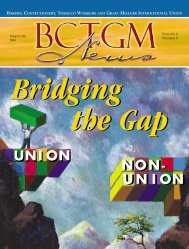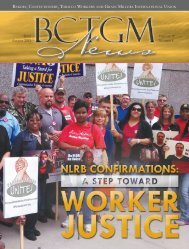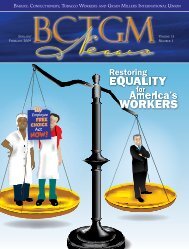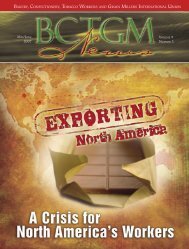to view/print. - BCTGM
to view/print. - BCTGM
to view/print. - BCTGM
You also want an ePaper? Increase the reach of your titles
YUMPU automatically turns print PDFs into web optimized ePapers that Google loves.
Canadian Labour’s Social ObjectivesWWhen the Ontario SuperiorCourt of Justice ruled that theOntario government did not havethe proper legal authority <strong>to</strong>relinquish public control ofHydro One—the Ontario electricitytransmission grid—it was avic<strong>to</strong>ry for the labour organizationsand groups that vigorouslyopposed the privatization andderegulation of electricity in theprovince. The effort by organizedlabour <strong>to</strong> fight this privatizationis but anotherexample of themovement’s ability<strong>to</strong> successfullymobilize aroundimportant socialissues that affect alarge majority ofthe population.Since the late1800s, Canadianunions have soughtsocial, economicand legal changesthat would benefitworking families.Despite being challengedby a lack oflegal status, theearly Canadianlabour movementfought for improved working conditions;laws that would regulatehealth and safety, the eliminationof ‘sweatshop’ conditions,an end <strong>to</strong> the use of prisonlabour, the implementation of aneight-hour work-day and ultimately,the right <strong>to</strong> form a union.However, in addition <strong>to</strong> fightingfor changes <strong>to</strong> the conditions ofemployment, unions were alsoearly advocates for a universalhealth care system, unemploymentinsurance, increased educationalfunding, and later, subsidizeddaycare.“The social objectives of the<strong>BCTGM</strong> in Canada <strong>to</strong>day are areflection of the aims anddesires of a large segment of thecountry’s working population,”says International Vice PresidentSean Kelly. <strong>BCTGM</strong> leaders andactivists believe that the interestsof thelabour movementare notrestricted <strong>to</strong>conditions ofemploymentand working conditions.Working with labour councilsand provincial federations oflabour, <strong>BCTGM</strong> members havevocalized their support for theSince the late1800s, Canadianunions have soughtsocial, economic andlegal changes thatwould benefitworking familiesmaintenance of a publicly fundeduniversal health care system,subsidized childcare services,fair international trade standards,progressive tax policies,and the protection of importanthuman rights; issues that affectevery worker in Canada, regardlessof gender, race, or religion.As the Ontario Hydro exampleillustrates, organized labourcan successfully be a part of creatingpositive changes in societythat benefit all working families.But organized labour cannot doit alone. “Politicians at both theprovincial and federal level havebecome either <strong>to</strong>o comfortablewith the status quo, or havebeen actively supporting legislationthat is against the interestsof working people,” adds Kelly.<strong>BCTGM</strong> members and the labourmovement in general, mustmobilize workers, and not just intimes of crisis, <strong>to</strong> actively confrontthe powerbrokers inCanadian society.Politicians makepolicy and passlaws. Politiciansalso respond <strong>to</strong>public pressure.“If the labourmovement wants<strong>to</strong> repeat the successesit has hadin the past—Medicare,Canada Pension Plan, publiceducation—then it must mobilize,educate, and insist that its<strong>view</strong>s be heard and acted upon,”Kelly concludes.May/June 2002 www.bctgm.org 13
















